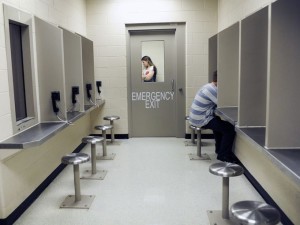SLO County Jail procedures deemed unconstitutional
May 20, 2015
 By STEW JENKINS
By STEW JENKINS
California’s 3rd District Court of Appeal recently upheld a ruling barring a county jail from requiring glass partitions between inmates and lawyers, a more than 40 year practice of the San Luis Obispo County Sheriff’s Department.
In 2013, following the lead of San Luis Obispo County, the Sheriff of Nevada County, California installed glass-partitioned interview rooms requiring in most cases that prisoners meeting with their attorneys communicate exclusively via a reportedly unmonitored telephone, with no ability to share and go over reports, documents, or other evidence together. In response, lawyers for several different prisoners sought orders from the Nevada County Superior Court to restore their “contact visits” with their attorneys.
Over the opposition of Nevada County’s sheriff and county counsel, the Superior Court ordered “that confidential attorney-client contact visits (which the court defined as visits in a meeting space without physical barriers between attorney and client) be made available at the jail absent circumstances justifying suspension of such visits in individual cases.”
The County of Nevada appealed the ruling in an attempt to restore these limits on attorney-client consultations. Joining Nevada County’s unsuccessful appeal were the California State Sheriffs Association of which SLO County Sheriff Ian Parkinson is a past president, the California Police Chiefs and the California Peace Officers Association.
Since the 1970s, San Luis Obispo County’s sheriffs have mandated this kind of separation of prisoners from their attorneys, citing safety and security concerns. San Luis Obispo criminal defense attorneys typically must obtain a court order before being permitted by the sheriff to engage in a “contact visit” where they can sit in an unmonitored room with their clients at the jail to interview, review documents and prepare for trial together.
The ruling was in part based on the U.S. and California Constitution’s rights for an accused to be represented by an attorney and on the U.S. and California Constitutions’ rights of all individuals to have “meaningful access to the courts.”
The third district held that “despite great deference to security judgment of those who operate penal institutions, ‘the courts cannot abdicate their responsibility to protect inmates’ rights to adequate contact with their attorneys and to disapprove of visitation requirements that place a chilling effect on attorney visitation, especially when the security risk in a given case is ephemeral.’” Examples of when partitions should be required were described by the justices as “extreme cases” such as an inmate who had attacked their attorney, or smuggled drugs or attempted an escape through an attorney.
Writing for a unanimous court, Justice Louis Mauro said that “inmates have a constitutional right to (A) confidentially confer with counsel, and (B) have contact visits with counsel as part of their right to meaningful access to the court. The county’s generalized concern in this case that safety will be improved if inmates are separated from their lawyers by partitions is not sufficient ….”
On May 14, the Third District Court of Appeal in Sacramento ordered publication of the opinion which, until that moment, affected only the Nevada County Jail. Realizing the importance of their opinion in “County of Nevada v. Superior Court,” a unanimous court ruled that its decision should be published in order to apply to all the county sheriffs and jails in California.
Stew Jenkins has practiced law in San Luis Obispo County since 1978. His recent civil rights cases include SLO Homeless Alliance v. City of San Luis Obispo (enjoined enforcement of “no sleeping in vehicles” ordinance against poor people), Torres v. Brennler (Anti-SLAPP motion throwing out law suit designed to impair press freedom), and Barta v. Secretary of State Debra Bowen (holding unconstitutional Elections Code statutes requiring a loyalty oath to join a political party committee). Jenkins’ practice includes municipal law, tax payer suits, estate planning and family law, and he was recently elected chair of the San Luis Obispo County Chapter of the ACLU.
Don’t miss links to breaking news stories, like CCN on Facebook.






The comments below represent the opinion of the writer and do not represent the views or policies of CalCoastNews.com. Please address the Policies, events and arguments, not the person. Constructive debate is good; mockery, taunting, and name calling is not. Comment Guidelines